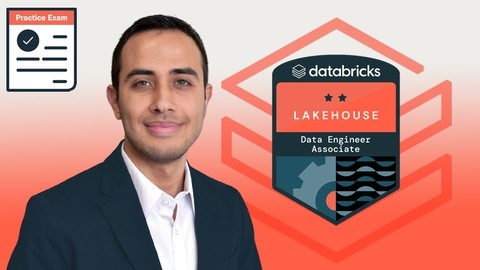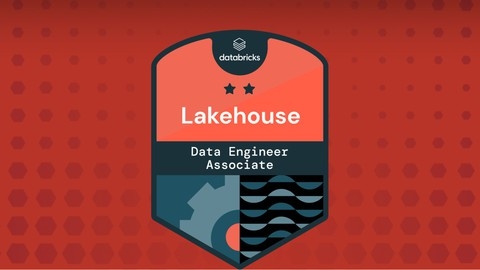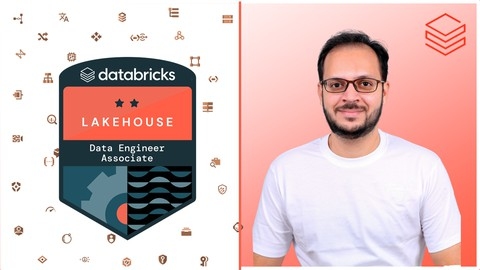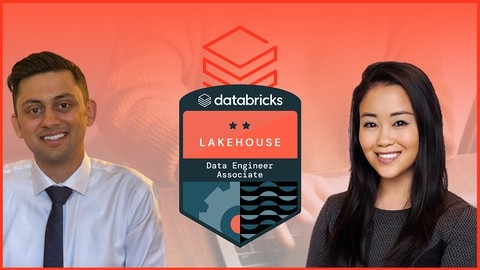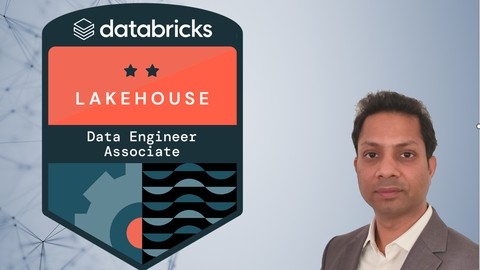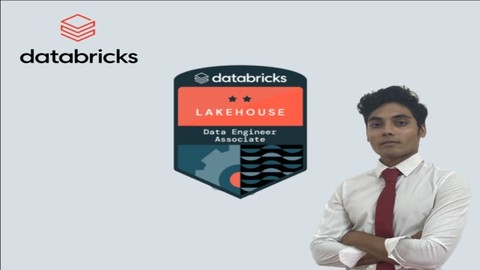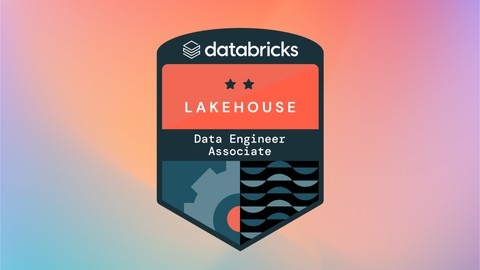Databricks Certified Data Engineer Associate is a coveted certification that validates your skills in building and managing data pipelines on the Databricks platform.
This powerful, cloud-based platform combines data warehousing and data lake capabilities, empowering data engineers to handle large-scale data processing and analysis.
By earning this certification, you can prove your expertise to potential employers and unlock exciting opportunities in the rapidly growing field of data engineering.
Finding the right Databricks Certified Data Engineer Associate course on Udemy can be a daunting task, with so many options available.
You’re looking for a program that provides comprehensive coverage of the exam syllabus, features hands-on labs, and is taught by experienced instructors who can guide you through the complexities of the Databricks platform.
For the best Databricks Certified Data Engineer Associate course overall on Udemy, we recommend Databricks Certified Data Engineer Associate - Preparation.
This course stands out for its comprehensive coverage of the exam syllabus, including topics like Delta Lake, Spark SQL, Structured Streaming, and Delta Live Tables.
The course features numerous hands-on labs that allow you to apply your learning to real-world scenarios, giving you the practical experience needed to tackle the certification exam with confidence.
This is just the beginning of our exploration of the best Databricks Certified Data Engineer Associate courses on Udemy.
Keep reading to discover our full list of recommendations, tailored to different learning styles and goals, from beginner-friendly introductions to advanced courses focused on specific Databricks features and use cases.
Databricks Certified Data Engineer Associate - Preparation
The course starts with an introduction to Databricks, guiding you through setting up a free trial on Azure and exploring the workspace.
You’ll learn the fundamentals of creating clusters, working with notebooks, and leveraging Databricks Repos for version control and collaboration.
Next, you’ll dive into the Databricks Lakehouse Platform, where you’ll gain a deep understanding of Delta Lake, an open-source storage layer that brings reliability and performance to data lakes.
Through hands-on exercises, you’ll explore advanced Delta Lake features and learn how to set up Delta tables.
The course also covers relational entities like databases, tables, and views, enabling you to work effectively with structured data on Databricks.
One of the key aspects of this course is its focus on ELT (Extract, Load, Transform) using Spark SQL and Python.
You’ll learn how to query files, write to tables, and perform advanced transformations.
The hands-on approach allows you to apply higher-order functions and SQL UDFs to solve real-world data challenges.
As you progress, you’ll explore incremental data processing using Structured Streaming and Auto Loader.
These powerful tools enable you to handle real-time data streams and efficiently ingest data incrementally.
You’ll also learn about the multi-hop architecture, which allows you to build scalable and fault-tolerant data pipelines.
The course dedicates a significant portion to production pipelines, where you’ll gain hands-on experience with Delta Live Tables (DLT) and Change Data Capture (CDC).
You’ll learn how to process CDC feeds with DLT and orchestrate jobs to automate your data workflows.
Additionally, you’ll explore Databricks SQL, a powerful tool for querying and visualizing your data.
Data governance is a critical aspect of any data engineering role, and this course ensures you’re well-prepared.
You’ll learn how to manage permissions and work with Unity Catalog to enforce data access controls and maintain a single source of truth for your data assets.
Throughout the course, you’ll have the opportunity to apply your knowledge through hands-on exercises and real-world scenarios.
The course materials are designed to reinforce your learning and provide you with practical experience that directly translates to the certification exam and your future data engineering projects.
By the end, you’ll have a solid foundation in Databricks and the skills necessary to tackle the Databricks Certified Data Engineer Associate exam with confidence.
Practice Exams: Databricks Certified Data Engineer Associate
This syllabus includes two full-length practice exams that closely mimic the real Databricks certification test.
Taking realistic practice exams is one of the most effective ways to get ready for the big day.
You’ll get hands-on experience with the types of questions and scenarios you’ll face on the actual Databricks Certified Data Engineer Associate exam.
The practice tests will help you identify areas where you need more study and practice.
Working through full-length exams also helps build your test-taking stamina and confidence.
You’ll get a feel for managing your time and thinking through tough questions under pressure.
That way, when you sit for the real Databricks certification, the format and duration won’t throw you off your game.
The practice exams in this course are thoughtfully designed to cover all the key topics and skills a Databricks Certified Data Engineer Associate needs to demonstrate.
You’ll be tested on core concepts like Databricks architecture, data pipelines, data transformation, and performance optimization.
Expect a mix of multiple-choice and hands-on coding questions that really put your knowledge to the test.
While practice exams alone aren’t a complete preparation strategy, they’re an essential part of your study plan.
Combining targeted training materials with plenty of realistic practice sets you up for success on the Databricks Certified Data Engineer Associate exam.
If you’re serious about earning this valuable certification, investing time in high-quality practice exams is a smart move.
Databricks Certified Data Engineer Associate Practice Exams
Through a series of five comprehensive tests, you’ll gain hands-on experience with the Databricks Lakehouse Platform and its various components.
As you progress through the tests, you’ll develop a solid understanding of the Lakehouse Platform’s architecture and capabilities.
You’ll learn how to navigate the Databricks workspace efficiently, which is crucial for any aspiring data engineer.
The course focuses on building your skills in performing multi-hop architecture ETL tasks using Apache Spark SQL and Python.
You’ll work with both batch and incrementally processed paradigms, ensuring you’re well-versed in different data processing scenarios.
This practical experience will give you the confidence to tackle real-world data engineering challenges.
In addition to ETL tasks, the course covers the creation and deployment of basic ETL pipelines and Databricks SQL queries and dashboards.
You’ll learn how to put these elements into production while maintaining proper entity permissions, which is essential for ensuring data security and integrity.
By the end, you’ll be equipped with the knowledge and skills necessary to complete basic data engineering tasks using Databricks and its associated tools.
You’ll be well-prepared to take on the Databricks Certified Data Engineer Associate certification exam and demonstrate your expertise to potential employers.
Databricks Certified Data Engineer Associate Exam Guide
You’ll start by getting familiar with Databricks, its user interface, and how to create clusters on Azure.
From there, you’ll dive into the core concepts like Delta Lake, which allows you to work with data lakes as tables.
Through hands-on labs, you’ll learn how to create and query Delta Lake tables.
The course takes you through the Databricks Lakehouse platform and its various data objects like databases, tables, and views.
You’ll practice importing data, querying files, and writing to tables using Spark SQL and Python for ELT processes.
One key area is accessing data from Azure Data Lake Storage (ADLS) using access keys, SAS tokens, and mounting ADLS to DBFS.
You’ll also learn about secret scopes for secure credential management.
The course covers advanced data engineering patterns like the Medallion Architecture for multi-hop data processing.
You’ll work with Structured Streaming for real-time data ingestion and Auto Loader for incremental batch loads.
Delta Live Tables, a powerful tool for building data pipelines, is also covered extensively.
For operationalizing your workloads, you’ll learn how to create and schedule jobs in Databricks.
Additionally, you’ll build dashboards to visualize and monitor your data.
Data governance is crucial for enterprises, so the course teaches you how to manage data object privileges for secure data access.
Databricks Certified Associate Data Engineer Practice Exams
This course offers two comprehensive practice exams to prepare you for the certification.
The first practice exam tests your knowledge across various topics, while the second one simulates the actual exam experience with 45 questions to be answered within 90 minutes.
You will face questions that mirror the difficulty level and topic order of the real certification exam.
This hands-on approach allows you to gauge your readiness and identify areas that need further study.
The practice exams cover key concepts related to Databricks, data engineering, and the Associate Data Engineer role.
By taking these practice tests, you can familiarize yourself with the exam format and develop strategies to manage your time effectively during the actual certification.
Databricks Certified Data Engineer Associate Exam Prep 2023
You’ll start with an introduction to Databricks and its Data Lakehouse platform, including Delta Lake and the Unity Catalog.
This lays the foundation for understanding the core components you’ll be working with.
Next, you’ll dive into the Databricks workspace, learning how to navigate the UI, create clusters, work with repos and notebooks.
Having hands-on experience with these tools is essential for the exam.
The course then moves into relational entities like databases, tables, and views within Databricks.
You’ll learn how to query files directly and perform data extraction, cleaning, and transformations using ELT with Spark SQL and Python.
These are key data engineering skills tested on the exam.
Structured Streaming and Delta Live Tables, which are powerful Databricks features, are covered in-depth.
You’ll learn how to build and monitor data pipelines using these technologies.
Navigating production workflows is another important aspect, and the course walks you through task orchestration and lab exercises to reinforce these concepts.
Data governance topics like the Unity Catalog, entity permissions, and the Data Explorer UI are also included, ensuring you understand data management in Databricks.
Finally, you’ll learn about Databricks SQL, creating warehouses, and performing last-mile ETL operations.
Databricks Data Engineer Associate Certification Preparation
This course starts with an introduction to Databricks, covering how to set up a community account and exploring the workspace.
You’ll learn about clusters, a key component of Databricks, including how to create and manage them.
The course dives deep into notebook basics, sharing notebooks, and implementing CI/CD with Databricks.
You’ll gain insights into the Databricks Lakehouse platform, its architecture, and the powerful Delta Lake storage layer.
Hands-on labs will teach you how to read data in various formats, create Delta tables, enforce constraints, partition data, and perform time-travel and optimization operations.
Data transformation is a crucial aspect, and you’ll learn how to use Apache Spark for cleaning, combining, reshaping tables, joining datasets, and working with higher-order functions.
The course covers passing data between PySpark DataFrames and Spark SQL, as well as user-defined functions and control flows.
Incremental data processing is explored through structured streaming and autoloader concepts.
You’ll also learn about multihop architectures and implement them in a lab environment.
Delta Live Tables and change data capture are covered, preparing you for production data engineering pipelines.
The course teaches you how to work with Databricks SQL, set up alerts and dashboards, and schedule jobs using notebook parameters.
You’ll understand entity permissions and the Unity Catalog, essential for managing access and governance.
Finally, the course provides exam guidance, ensuring you’re well-prepared for the certification exam.
Databricks Certified Associate Data Engineer-Practice Tests
This course offers practice tests that closely mirror the real exam environment.
It includes two practice tests with randomized questions and answers, just like the actual certification exam.
One key feature is that you can only review the answers after completing the practice test on Udemy’s platform.
This simulates the real exam experience where you won’t have access to the questions and answers afterwards.
Each practice test has 45 questions to be answered within 90 minutes, and you need to score at least 70% to pass.
If you have any concerns or questions during the test, you can post them along with a screenshot in the Q&A section, and the instructors will provide a swift resolution.
The course also includes access to a community where you can interact with other learners and get support during your learning journey.
The instructors encourage you to join this community for additional resources and support.
The testing experience is designed to be flexible, allowing you to pause and resume the test at your convenience.
You can also retake the practice tests an unlimited number of times to improve your skills and prepare thoroughly for the certification exam.
During the test, you’ll see a progress bar at the top that displays your remaining time and progress.
Even if the time expires, you can continue working on the test.
You can also mark questions for review and revisit them later before submitting your final answers.
Databricks Certified Data Engineer Associate Practice Sets
This course provides you with multiple full practice sets and revision sets to prepare for the Databricks Certified Data Engineer Associate Exam.
You will get three comprehensive full practice sets that cover most of the exam questions.
Additionally, there are three focused revision sets specifically designed to help you strengthen your understanding of key areas like incremental data processing and production pipelines.
The practice materials closely mirror the actual exam format, with 45 multiple-choice questions to be completed within 90 minutes.
The passing score for certification is 70%.
By working through these practice sets and revision sets, you can gauge your readiness and identify any areas that need further study.
The course offers a closed-book environment, replicating the real exam conditions.
This approach ensures you are well-prepared for the challenges you’ll face during the actual certification exam.
Databricks Data Engineer Associate Preparation Test Series
This is a set of practice tests that mimic the actual exam format and content.
The certification exam is proctored, meaning it is monitored to ensure integrity.
It contains 45 multiple-choice questions that must be completed within 90 minutes.
The questions cover five main topics: Databricks Lakehouse Platform (11 questions), ELT with Spark SQL and Python (13 questions), Incremental Data Processing (11 questions), Production Pipelines (7 questions), and Data Governance (3 questions).
You will take practice exams with the same structure, timing, and question distribution as the real exam.
This allows you to get a realistic sense of the exam experience and identify areas where you need further preparation.
The course focuses on providing you with ample practice opportunities to increase your chances of success on the certification exam.


